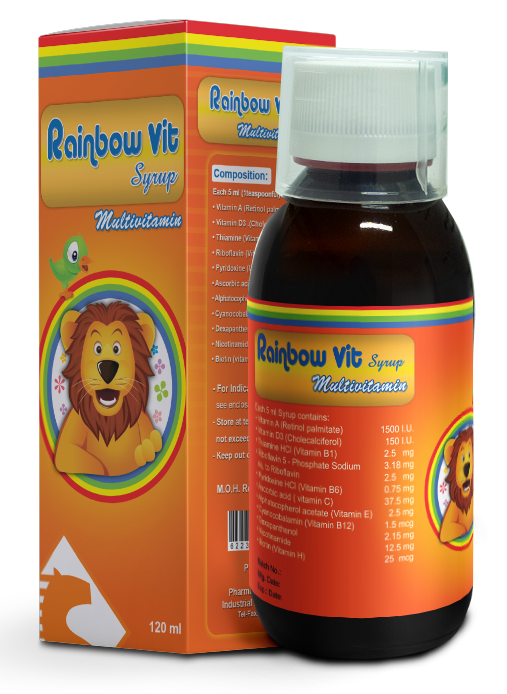
Category: Dietary Supplements
RAINBOWVIT SYRUP
Multivitamin without minerals
Active Ingredients: Vitamin B complex plus vit. C, vit. A, vit. D3 and vit. E.
Composition:
Each 1 ml of drops contains
Alfacalcidol 2 mcg
Indication and usage:
Diseases caused by disturbances in the calcium metabolism in consequence of reduced endogenous production of 1,25-dihydroxyvitamin D3 as:
Renal osteodystrophy.
Postoperative or idiopathic hypoparathyroidism.
Pseudohypoparathyrodism.
As an adjunct to the management of tertiary hyperparathyroidism.
Vitamin D· resistant rickets or osteomalacia.
Vitamin D-dependent rickets, neonatal
Hypocalcaemia or rickets.
Malabsorption of calcium,
Malabsorptive and nutritional rickets and
Osteomalacia.
Postmenopausal osteoporosis.
Dosage & administration:
Initial dose:
Adults and children above 20 kg body weight: 1 mcg daily
Children under 20 kg body weight: 0.05mcg/kg/day
Neonates: 0.1mcg/kg/day
Dosage in the elderly: 0.5mcg/day
It is important to adjust dosage thereafter according to the biochemical responses and to avoid hypercalcaemia. Indices of response include levels of serum calcium, alkaline phosphatase, parathyroid hormone, urinary calcium excretion as well as radiographic and histological investigations. Patients with marked bone disease (other than those with renal fai lure) may tolerate higher doses without developing hypercalcaemia. However, failure of the serum calcium to rise promptly in osteomalacia patients does not necessarily mean that a higher dose is required since calcium from increased intestinal calcium absorption may be incorporated into demineralized bone, The dose requirements generally decrease in patients with bone disease when there is biochemical or radiographic evidence of bone healing and in hypoparathyroid patients after normal serum calcium levels have been attained, Maintenance doses are generally in the range of 0.25 to 1 mcg daily.
In patients with osteoporosis receiving Alfacalcidol, the recommended dosage for Alfacalcidol for postmenopausal osteoporosis patients is 1 mcg daily.
The dose should be titrated according to the individual needs. Calcium supplementation should not be required if the normal dietary intake is in region of 1500 mg per day. However, many postmenopausal patients have dietary intake as little as 600 mg per day and calcium supplementation of 0.5 – 1 g per day could be required
Package & storage:
Carton box containing bottle of 10 ml + insert
Keep refrigerated at 2-8°C, Should be protected from light.
keep out of reach of children.